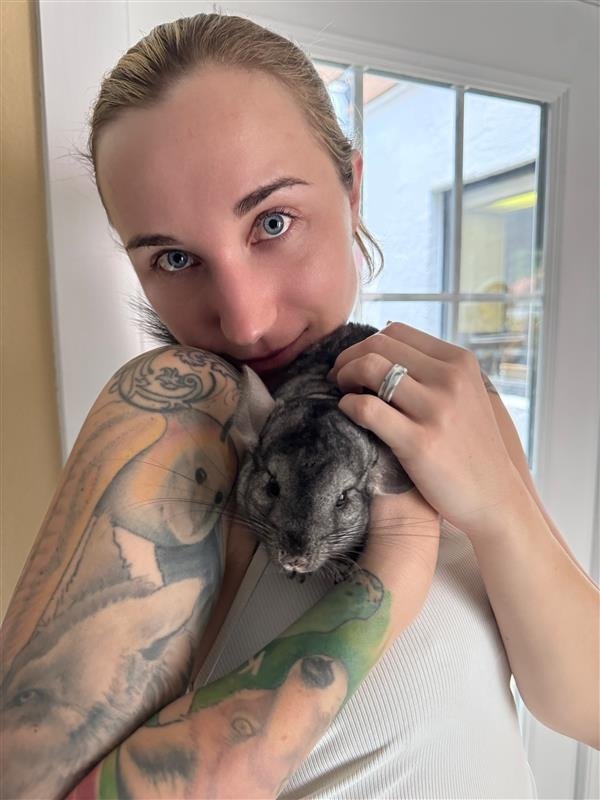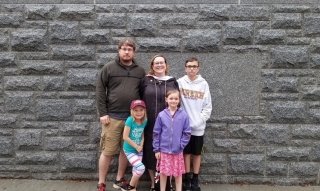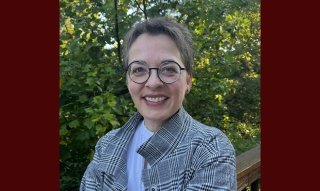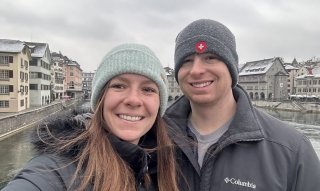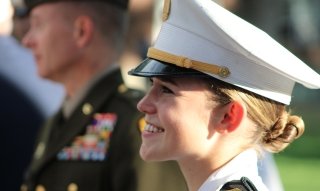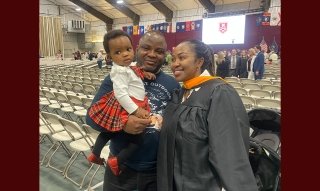Ilona Letran
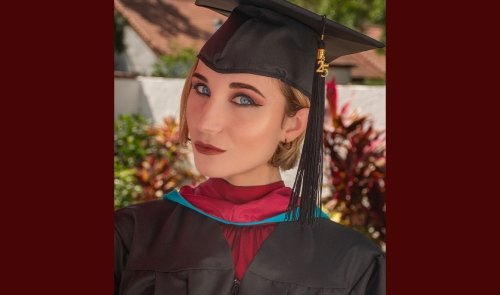
Stereotypes exist and I want to break them. As an Eastern European woman, I was raised to be a housewife. I didn’t want that; I wanted to make my own money. I want to demonstrate that as a woman, as someone with ADHD, you can do it.
Q: “Tell us about yourself.”
A: “I'm an immigrant from Ukraine who never lost her American Dream of a higher education vision. My goals were met due to my wonderful husband's never-ending support (and lots of proofreading) and my family, whose encouragement kept me going. After 12 years of active duty in the U.S. Army, I took a break in service to pursue my Master's, so I joined the U.S. Army Reserve. This degree is likely to guide me towards becoming a commissioned officer, so my fingers are crossed. I am a proud mother of 3 rescue chinchillas, and I am ready to have two more rescues (as long as my husband doesn't know).”
Q: “Please describe briefly your professional experience and current employment.”
A: “I am currently employed as a social media threat analyst for a large corporation's C-suite executive protection intelligence team. My military experience is predominantly in linguistics, the New START Treaty, and all-source analysis.”
Q: “What motivated your switch from Active Duty Army to the Army Reserve?”
A: “The idea started with pursuing a master’s degree. After 12 years of active duty, especially as a Ukrainian-born U.S. soldier, I realized that time with family is precious, so I made the decision to switch to the Army Reserve and spend more time with my family.”
Q: “What was your motivation for pursuing your degree?”
A: “For me, a master's degree is the halfway point for my PhD. I was always a go-getter when it came to education, and I am not stopping anytime soon.”
Q: “What are your future professional plans?”
A: “After I receive my Norwich official transcripts, I will submit my direct commission selection package to the board and hope for the best. If I am not selected, then I will finish my military service and pursue my PhD either domestically or internationally.”
Q: “You mentioned that your degree might guide you towards commissioning as an officer in the army. Can you share more about what that path might look like?”
A: “Next year, there will be a board for direct Commission, and it is my goal to be considered at that time. My military background, combined with my degree in global affairs, makes me the ideal candidate. As an analyst, my degree broadened my scope from tactical, operational, and strategic to global. What I want to do as an officer is lead people on a larger scale and improve poor environments. I want my subordinates to grow professionally and personally. Ultimately, I joined the military to help people, and serving as an officer will improve my ability to do that.”
Q: “Would you say that your master’s degree positioned you well to achieve that?”
A: “The officer position I will be boarding for is an Army Military Government Officer in the Reserve. Norwich set me up perfectly because my degree plan lines up perfectly with the job description of the position. The role had different subcategories to fill, and the one they needed was nearly verbatim with what was covered in my degree. It seemed like it was meant to be.”
Q: “How do you plan to use your degree in your career?”
A: “As of now, I am going to focus on trying to publish some of the side projects I've been working on.”
Q: “Is there anything you would like to share about those projects?”
A: “Without going too in-depth, I am working on a project for the Department of Defense (DoD) to impact larger recruiting efforts. I am also working with local Army public affairs offices and applying my skillset as a social media analyst.”
Q: “Were you able to put your knowledge gained in the classroom to work immediately at your job?”
A: “Yes. I am one of the main writers for my team as far as long-term analysis goes, so having this degree has broadened my analytical perspective to a whole new level.”
Q: “Should Reservists take advantage of their education benefits?”
A: “Do it. I see so many people not using their benefits, and it frustrates me. Even a graduate degree was essentially free. I had to pay a little bit of a book fee because I like to have eBooks, but that was a fraction of what most people pay, and Norwich gives huge incentives for veterans. I received a hefty discount for my tuition and still have some of my GI Bill left to apply for my PhD.”
Q: “What do you want to get your PhD in?”
A: “Global affairs, but as a Doctor of Philosophy. I found a program in Iceland where the degree plan looks perfect, and I’m already strategizing my dissertation. I love reading and writing and am a huge Game of Thrones nerd, so my saying is ‘I read, and I write things.’”
Q: “Why did you choose Norwich?"
A: "The current Sergeant Major of the Army (SMA) went to Norwich. He is a living legend of the Special Operations Forces (SOF) Community; therefore, I wanted to be a part of his legacy and go to the same university as him.”
Q: “How does his (SMA) and Norwich's military tradition influence who you are?”
A: “When the SMA came on board, I could see how understanding he was. He came from a Special Forces background, and that’s a community I support. He is a role model for me, and the more I read about him, the more I like him. When I started researching schools for my graduate degree, a coworker told me that the SMA went to Norwich. That solidified my choice to go to Norwich as well. I wish I had known about Norwich’s Strategic Studies and Defense Analysis (SSDA) program before I got my undergraduate degree, because I would have elected to go for that as well.”
Q: “What was the deciding factor in pursuing an online degree versus a traditional on-campus degree?”
A: “I wanted to have a flexible schedule as I do have ADHD, and it is more difficult for me to keep up with an in-class environment. Additionally, I did not know what was waiting for me outside of active-duty military, so an online degree was the best way to go.”
Q: “Many people with ADHD struggle when taking courses online. What was the secret to your success?”
A: “I took my brain to the gym. I trained it to enjoy the coursework by finding the aspects of it that I was passionate about. So, rather than being a chore, it was something I looked forward to and wanted to spend extra time doing. I really enjoy research and learning new things. I arm myself with information. With each assignment, I knew I would need to research to do it well, so I focused on that part.
Procrastination is a big problem. To solve that, I make a list of what needs to be done because there is mental satisfaction from crossing things off the list.
I planned for when I would do things each week. For example, I would try to knock out my reading on Sundays. I would look at the questions before reading, and then the answers would pop up as I was reading. On Mondays, I would make a post. I am a routine person, and creating this routine was critical to my success.
Lastly, I controlled distractions. My husband knows to leave me alone when I’m studying, and I have a quiet space in my home office. Hyper focus was essentially a superpower in this context.”
Q: “What does earning your master's degree mean to you?”
A: “A precedent for other people to follow because you can do it. Stereotypes exist and I want to break them. As an Eastern European woman, I was raised to be a housewife. I didn’t want that; I wanted to make my own money. I want to demonstrate that as a woman, as someone with ADHD, you can do it.”
Q: “You spoke highly of your professors, but you also mentioned your success coach, Bethany. How did they improve your experience?”
A: “Bethany Reynolds was my coach, and she was the best! During my time at Norwich, I accidentally missed one of the registration deadlines. I reached out to her, and she was able to get me into class. We worked out a method of contact that worked best for me, and she constantly kept in touch. She came across as so professional. She kept me on track, and she kept me going!”
Q: “What was the most challenging course throughout your degree program?”
A: “My first course was a little difficult for me (learning schools of thought) because I don't have a political science background. My undergraduate degree is in healthcare management, and so I had to work hard to get up to the baseline for it. It was interesting and challenging, so I ended up reading more and more about it and quickly caught up. One of the reasons I enjoy reading and learning is that it provides the ability to defend my viewpoints. Political science forces you to look at both sides and evaluate all the evidence without bias, and I enjoyed that aspect of the challenge.”
Q: “Were there any particular global issues that you studied during your degree program that sparked a deeper interest or passion?”
A: “There were actually two things that really resonated with me. The first was the topic of feminism, and the second was nuclear nonproliferation. I am a proud feminist, but what I have found is that everyone defines it differently. Most don’t have a true understanding of what it means. After we covered it and I shared my views during discussions, the other students continued to relate back to feminism with open minds. It was great that we were all able to enhance each other’s knowledge. I am so passionate about this topic that I plan to cover it for my dissertation when I pursue my doctorate.
The second topic was interesting because it had so many aspects. How do you reduce arms? How do you prevent nefarious countries from ignoring the plan? Can you still use nuclear as a power source or as a deterrence method? What type of treaty can streamline this process? It is and was a fascinating topic for me.”
Q: “What advice would you give other service members who are considering getting their graduate degree?”
A: “When you finish serving and transition to the civilian world, a master’s means money. Government service (GS) positions particularly like seeing degrees on your resume alongside military service. It puts you in a higher hiring bracket. We all have uncertainty about the future, and getting a degree helps solidify your future. Many people in the military think of themselves as replaceable, but they aren’t. Earning my degree opened my worldview and improved my self-worth. It can do the same for other service members.”
Q: “If you could go back and give yourself advice before starting your master's program, what advice would you give yourself?”
A: “Stop waiting, start sooner.
You become a different person in a way when you undertake a graduate degree. For me, it unlocked a different perspective and gave me new ways to consider and solve problems.”
Q: “Norwich has a reputation for being very challenging. The coursework is hard, and there's a lot of it. Was that your experience?”
A: “It was not easy. There were times I read until nine or ten at night after I had a full day of work. That's why I started reading before each week started. Sometimes it's dry, sometimes it’s interesting. The challenge meant that the caliber of students was higher. Not only would the professor answer questions and contribute, but each student was able to provide insight and work towards solutions. We all came from different backgrounds and were at different levels of previous experience.”
Q: “Do you feel like your degree lived up to your expectations for Norwich?”
A: “It exceeded my expectations because I didn't know I was going to be working that hard, but I loved it.”
Q: “Would you do it again?”
A: “Oh my God, yes, but I'll probably minor in something else. I probably would minor in Southeast Asia or the Middle East because I don't know anything about the Middle East.”
Q: “What aspects of your Norwich experience will you carry most strongly with you?”
A: “There were many things, but one of the strongest was learning how to provide constructive feedback. The professors had the best ways of doing this, and I plan to emulate them moving forward.”

